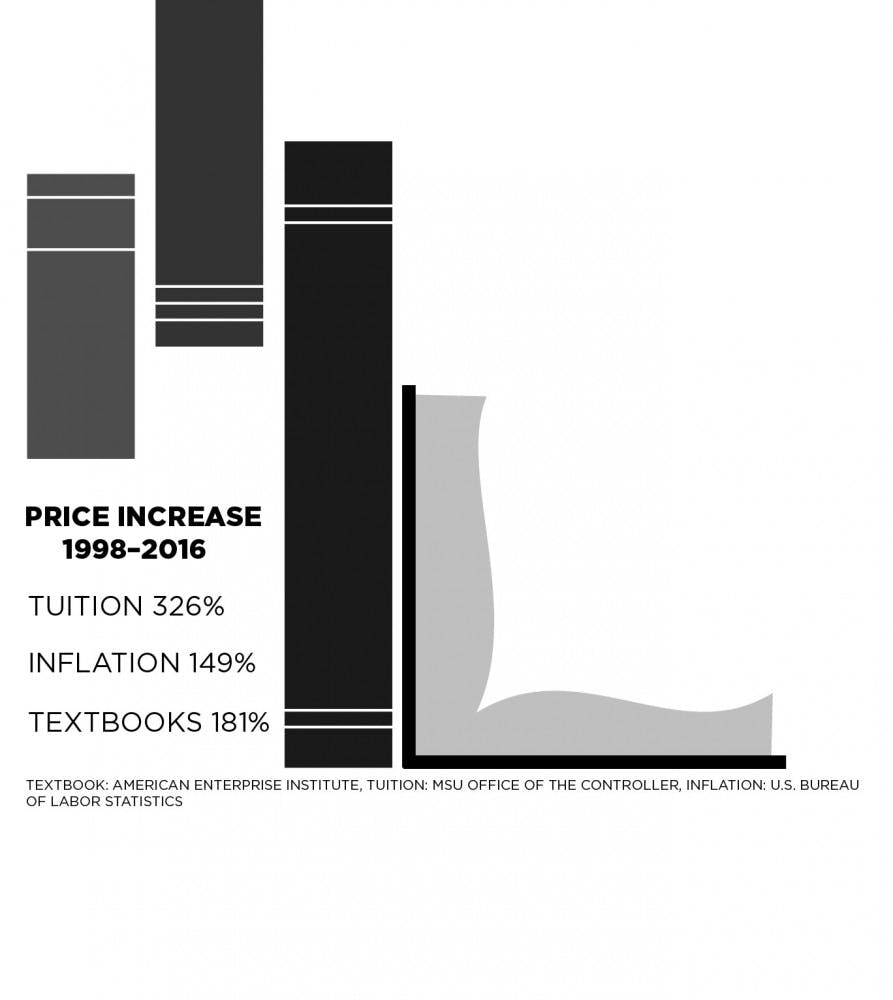Timbo X. Spartan is your typical MSU student. He goes to Economics 201 and Spanish 202 on Monday and Wednesday, and ISS 215 and Accounting 201 on Tuesday and Thursday.
According to the Student Book Store's current listings, the required texts for these courses would have our friend Timbo spending $100 on economics, $88 on Spanish, $160 on the ISS course and $187 on accounting. This adds up to $535 in materials for one semester.
Of course, this is all hypothetical, but not unrealistic. Chemical engineering sophomore Megan Richardson has spent more than $400 on materials for classes this semester and isn't finished shopping yet.
"Last year I spent close to $300 on one chemistry textbook," Richardson said. "This is on the higher end of what I've spent so far, but yeah. It's kind of ridiculous."
On top of tuition rates that have risen by more than $200 per credit hour over the past ten years and an East Lansing housing market where the average rental property runs about $1,400 a month, textbook prices leave some students without much money for the important stuff, like tickets to the football game or a keg of Keystone Light for after the football game.
Open educational resources, or OERs, are a potential solution to this problem. OERs eliminate or reduce the need for $300 textbooks by replacing them with open-sourced, often-free resources. Jeff Grabill, associate provost for teaching, learning and technology at MSU, said that open-source textbooks, one sector of OERs, can be both cheaper and more informational than traditional books.
"There's a possibility, depending on how they're made, that there are more authors, more ideas, so the resource can be better," Grabill said.
Grabill said you can't treat OERs as a single entity because there are many models. The OpenStax program through Rice University provides full textbooks in various courses like Precalculus and U.S. History, while Writing Commons reviews and posts shorter "webtexts" that focus on specific writing skills.
"There are companies in this space, there are non-profits in this space, there are professional associations and consortia in this space, and they all have different approaches," Grabill said. "Because of that, they have different economic models for how they sustain themselves and also different value propositions for students, for faculty and for institutions."
Grabill belongs to MATRIX, a center for new research technologies on MSU's campus. He said the center is interested in new resources not for teaching and learning, but rather scholarly pursuits. This idea, that there is a difference between open-source resources for class (like a textbook) and research publications (like scientific journals), adds even more complexity to the concept of OERs.
Undergrads, especially those in intro courses, are as of now an important focus group for open-source textbooks. In Openstax's case, their peer-reviewed textbooks cover the "highest-enrollment college courses." However, Ethan Watrall, associate director of MATRIX, said that there is potential for open-source textbooks and journals to be used in more specialized classes.
"For advanced classes that tend to require a much more specialized kind of source material, it's harder to get the kinds of textbooks with the kinds of materials that you want," Watrall said. "There is an incredible movement for academics to be publishing in open-access journals."
Not all students see equal value in these new developments. Ibrahim Kekec, a doctoral student in economics, feels that their usefulness varies. At the doctoral level, he referred to buying textbooks as "investing" in a continually-useful tool. However, for undergraduates who may never look at a book again once the semester ends, he sees the value of an open-source textbook.
"I like to have the book and go through the pages. I want a hard copy of it," Kekec said. "But if you're an undergraduate student and if you just need the book for the class, if you're not going to use that book later on in your life ... it might be better for them to go for the online textbook idea."
For all their potential, Watrall says a push to make OERs the norm at MSU on an institutional level is "non-existent." He said textbook publishers are currently making "obscene" amounts of money off of undergraduates, a trend that he thinks some, but not all, professors are indirectly promoting.
"The cost of textbooks has increased exponentially over the years," Watrall said. "Some faculty are quite honestly out of touch with that. The cost that they are asking their undergraduates to incur is incredible."
Because of this, Grabill said he intends to direct a project to better understand the economic effect of course materials on MSU students, with the end goal of implementing new resources based on what he finds.
"Fundamentally, if students are struggling to pay for their materials, then it's a problem," Grabill said.
Grabill thinks textbook prices are a "legitimate concern" for students, something Richardson somewhat agrees with. She said that although she has had to work throughout college to pay for her course materials, she hasn't had to struggle financially because of them.
"I've been kind of expecting that, hey, it's gonna be a lot, especially because my major –engineering – you're required to have a lot more materials," Richardson said. "(It's) not really like a financial burden, but it kinda sucks."
Support student media!
Please consider donating to The State News and help fund the future of journalism.
Discussion
Share and discuss “Open educational resources can offer relief from high textbook prices” on social media.







